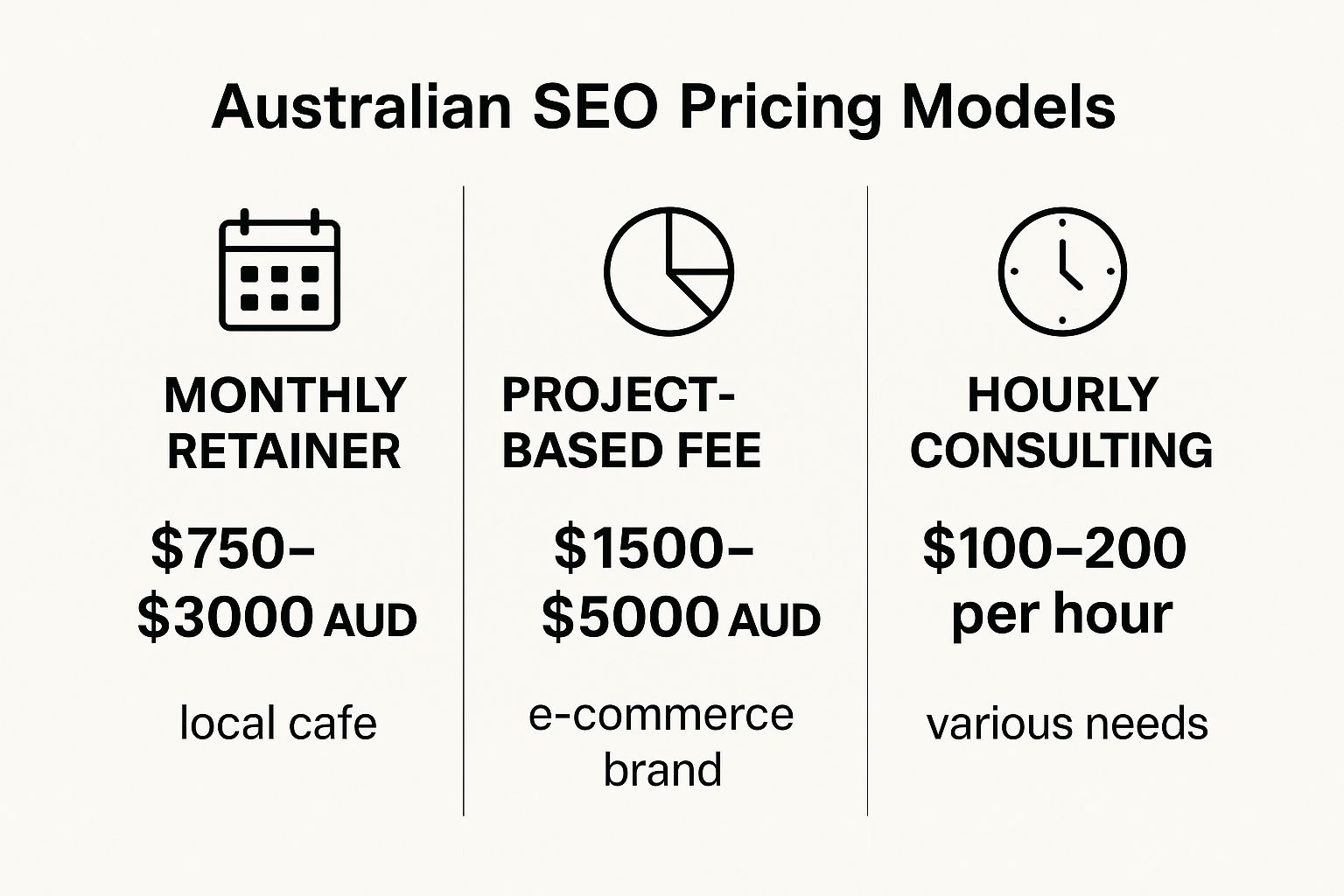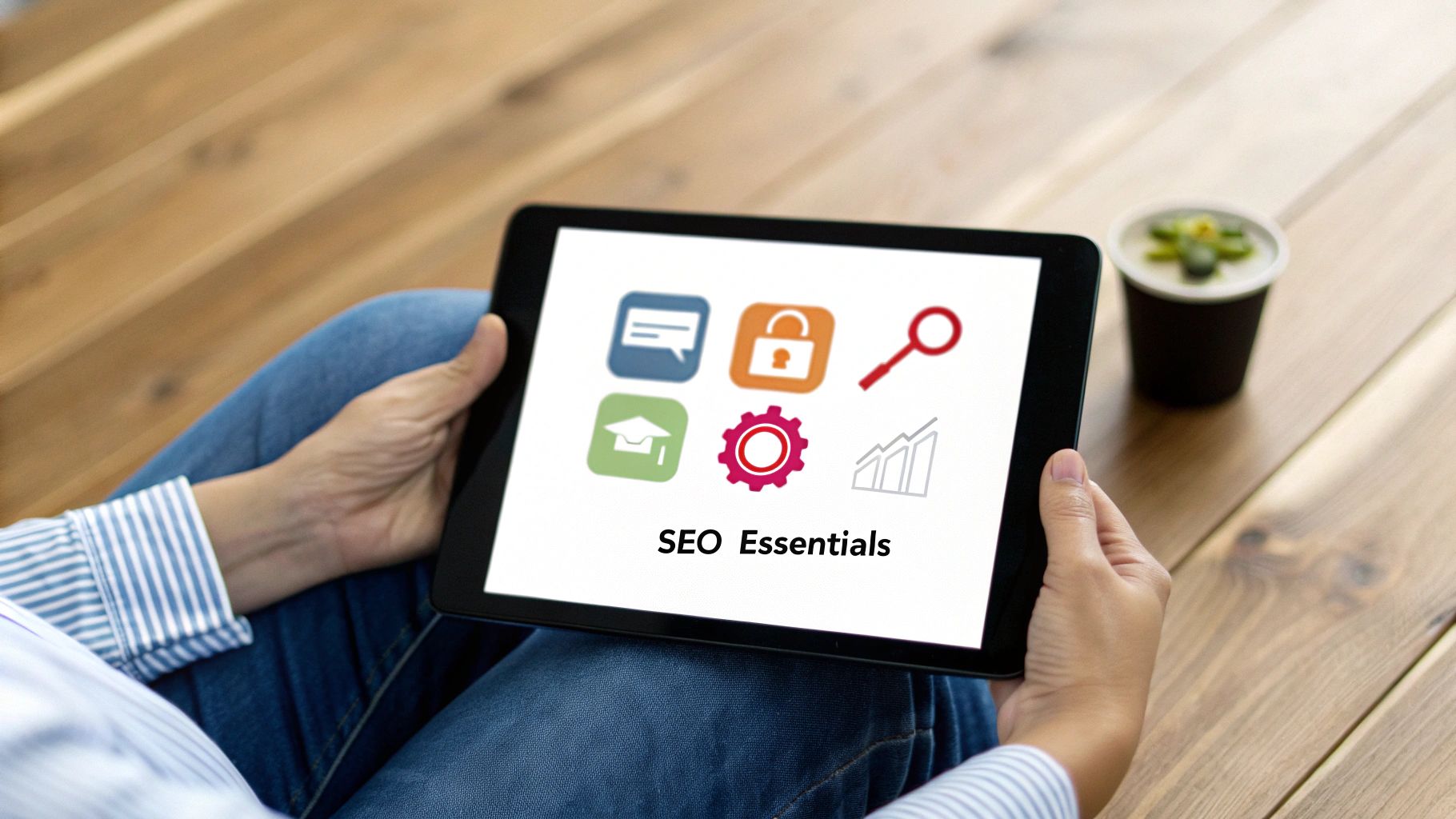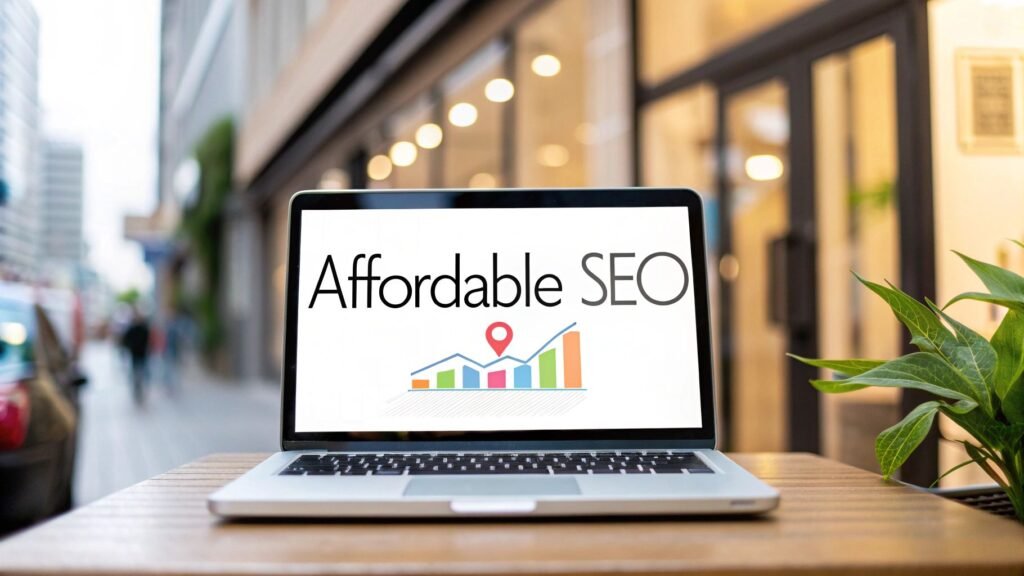When you start searching for affordable SEO services for small businesses, it’s easy to get fixated on the price tag. But here’s the thing: true affordability isn’t about finding the cheapest option. It’s about securing the best possible value and a strong return on your investment.
Think of it as a strategic move to build sustainable online growth—a smart investment in your business's future, not just another monthly bill.
What Affordable SEO for Small Business Really Means

Let's clear the air. In the world of Search Engine Optimisation, 'affordable' and 'cheap' are worlds apart. Cheap SEO services often cut corners, relying on risky, outdated tactics that can get your website penalised by Google. It’s a shortcut to nowhere.
Affordable SEO, on the other hand, is all about strategic efficiency. It means focusing on the high-impact activities that deliver real, measurable results without demanding a massive budget. It's like planting a tree for your business; you need a solid foundation and consistent nurturing, but over time, it grows into a valuable asset that brings in customers. This approach prioritises quality over quantity, making sure every dollar you spend is working hard for your business.
The Shift from Expense to Investment
One of the biggest mistakes small business owners make is viewing SEO as just another recurring expense. The right way to see it is as a strategic asset that actually grows in value over time.
Paid advertising is great, but it stops the moment you stop paying. A well-executed SEO campaign is different—it builds on itself. The content you create and the authority you build continue to attract new customers long after the initial work is done, creating a powerful momentum that pays dividends for years.
This mindset is crucial for small businesses trying to make their mark in the competitive Australian market. It allows you to build an advantage that doesn't rely solely on outspending the competition.
Journalist Tip: A Reddit-worthy angle is the "compounding interest" of good SEO. While paid ads are like renting an audience, quality SEO is like buying digital real estate. Every piece of optimised content and every backlink builds equity, creating an asset that generates leads passively, long after the initial investment is made. This shift from 'renting' to 'owning' your traffic is a game-changer for small businesses. The total industry value for SEO in Australia is now estimated at AUD 1.5 billion, proving businesses are buying into this long-term asset-building strategy. You can dive deeper into this shift in the latest Australian SEO industry report.
To get a clearer picture of what a valuable SEO package should include, let's break down the core components. These are the services that truly drive results and offer the best bang for your buck.
Core Components of a Value-Driven SEO Service
| Service Component | Why It's Essential for Small Businesses | Expected Outcome |
|---|---|---|
| Technical SEO Audit | Ensures your website has a strong, healthy foundation that search engines can easily crawl and understand. | Improved site speed, mobile-friendliness, and fewer errors holding you back. |
| Local SEO & GBP | Puts your business on the map for local customers who are actively searching for your services "near me." | Higher rankings in Google Maps, more phone calls, and increased foot traffic. |
| On-Page Optimisation | Makes sure your website's content is perfectly aligned with what your ideal customers are searching for. | Better keyword rankings for your core services and products. |
| Quality Content Creation | Builds authority and trust by providing valuable, helpful information that answers customer questions. | Increased organic traffic, more engagement, and establishing you as an expert. |
| Transparent Reporting | Gives you clear, easy-to-understand insights into how your investment is performing and what's working. | A clear view of your ROI and confidence in the strategy. |
Ultimately, these elements work together to create a robust SEO strategy that delivers sustainable growth. It's not about quick fixes; it's about building a powerful, long-term asset for your business.
What You Should Realistically Expect
An effective, affordable SEO plan will never promise you the top spot on Google overnight. Anyone who does is selling snake oil. What it will deliver is steady, sustainable progress you can see and measure.
Here’s what any valuable SEO service should always deliver:
- A Clear Strategy: Your provider shouldn’t just do things; they should be able to explain exactly what they’re doing and why it ties back to your specific business goals.
- Transparent Reporting: You deserve regular, easy-to-understand reports. These should show progress on the metrics that actually matter—like website traffic, keyword rankings, and most importantly, leads.
- Focus on Fundamentals: A solid plan will always cover the non-negotiables: your website's technical health, on-page optimisation, local visibility, and creating quality content that your customers will love.
How to Budget for SEO Services in Australia
Trying to set a budget for SEO can feel a bit like shooting at a moving target. But getting your head around the common pricing models here in Australia is the first real step to making a smart call for your business.
The goal isn't just to find the cheapest option. It’s about finding a pricing structure that actually lines up with your business goals and gives you a clear return on your investment.
Understanding Common SEO Pricing Models
Most agencies and consultants in Australia will price their work in one of three ways: a monthly retainer, a project-based fee, or an hourly rate. Each one has its place, and what's right for you depends entirely on what you need—whether you're a local cafe chasing more foot traffic or a small e-commerce brand wanting to be seen nationwide.
A monthly retainer is the most common setup for ongoing SEO work. Think of it like having an expert on your team, consistently working to improve your online presence month after month. This is perfect for businesses that need to put in a sustained effort to compete and grow over the long haul.
For specific, one-off jobs—like moving your website to a new platform or doing a deep technical audit—a project-based fee makes more sense. You agree on a fixed price for a clearly defined job, which is great for tackling a particular problem without locking into a long-term commitment.
Then there's hourly consulting, which is ideal for getting expert advice on a specific issue or for hashing out an initial strategy.
This table breaks down the typical pricing models to help you see where your business might fit.
Comparing SEO Pricing Models for Small Businesses
| Pricing Model | Typical Price Range (AUD) | Best For | Potential Pitfall |
|---|---|---|---|
| Monthly Retainer | $1,500 – $5,000+ per month | Businesses needing continuous, long-term growth and consistent effort. | Can be a significant ongoing expense if the strategy isn't delivering results. |
| Project-Based Fee | $1,000 – $10,000+ per project | One-off tasks like a technical audit, website migration, or a specific campaign. | The scope must be very clearly defined to avoid unexpected costs or incomplete work. |
| Hourly Consulting | $150 – $400+ per hour | Businesses needing strategic advice, training, or help with a very specific problem. | Costs can quickly add up if you need extensive or ongoing support. |
As you can see, the right model really depends on whether your business needs that steady, continuous growth, a one-time fix, or just some strategic guidance to point you in the right direction.

Aligning Your Budget with Business Goals
Your budget needs to be a direct reflection of what you're trying to achieve. A local business, for example, will get the most bang for their buck by investing in local SEO. This is a no-brainer in Australia, where 46% of all searches have local intent.
Even more compelling is that a whopping 78% of these local mobile searches lead to someone visiting a store within 24 hours. That single statistic shows just how powerful and profitable a locally-focused strategy can be. You can find more data like this in a report on the state of Australian SEO on SearchScope.
Journalist Tip: A Reddit-worthy angle is the massive disconnect between local search behaviour and small business readiness. Over three-quarters of local mobile searches convert to a store visit within a day, yet many businesses are nearly invisible online. A local plumber or cafe not optimised for "near me" searches is essentially putting up a 'closed' sign to a massive, ready-to-buy audience. That's a story of missed opportunity with a clear, actionable solution.
Spotting Red Flags in SEO Pricing
While you're hunting for affordable SEO services for small businesses, you have to be careful of deals that sound too good to be true. Because they usually are. Dangerously low prices are often a sign that an agency is cutting corners, maybe even using risky tactics that could get your website penalised by Google.
Here are a few major red flags to watch out for:
- Guaranteed #1 Rankings: This is the oldest trick in the book. No reputable SEO professional can guarantee a specific ranking. Google's algorithm is far too complex and changes constantly.
- Suspiciously Low Prices: A retainer under $500 AUD per month should set off alarm bells. Proper, effective SEO takes a significant amount of time, skill, and expertise, and that has a real cost.
- Lack of Transparency: If a provider is cagey about their methods or won't give you clear, straightforward reports, it's time to walk away. You should always know exactly what work is being done for your money.
Ultimately, choosing an SEO partner is a serious investment in the future of your business. By understanding these pricing models and knowing what red flags to look for, you can set a realistic budget and find a provider who offers genuine value, not just a cheap price tag.
The Core Services in an Effective SEO Plan

When you invest in affordable SEO services for small businesses, you're not just paying for a vague promise of "more traffic." You're buying a specific set of activities designed to turn your website into a consistent source of leads. Knowing what these core components are is the key to picking the right provider.
A proper SEO plan isn't just a random to-do list; it's a coordinated strategy. Each service builds on the others, creating a powerful effect. Let's break down the four pillars every small business needs to get right.
Local SEO: Getting on the Digital Main Street
For most small businesses, the battle is won locally. Local SEO is all about making your business impossible to miss for customers searching in your area. Think of it as claiming the best shopfront on your town's digital main street.
This is where your Google Business Profile (GBP) is your biggest asset. It's often the very first thing a potential customer sees.
For example, Australian businesses that fully complete their Google Business Profile can get up to 7 times more clicks than those who don't. That simple step drives real-world foot traffic and phone calls, directly fuelling your sales. The latest Australian SEO and marketing report has some great insights on this.
On-Page Optimisation: Aligning with Customer Intent
On-page optimisation is the art of making your website’s content a perfect match for what your customers are searching for. It's like making sure the signs inside your shop clearly point people to the exact products they want.
This goes way beyond just stuffing keywords onto a page. A good SEO provider will focus on:
- Title Tags and Meta Descriptions: Writing punchy, clickable headlines and summaries that stand out in search results.
- Content Relevance: Making sure your service pages and blog posts actually answer the questions your customers are asking.
- Internal Linking: Weaving a logical web of links between your pages to guide both visitors and search engines smoothly through your site.
Technical SEO: Ensuring a Healthy Foundation
Technical SEO is all the work done "under the bonnet." It ensures your website is fast, secure, and easy for Google to understand. If this foundation is shaky, all your other efforts will fall short.
A common mistake is ignoring your website's technical health until it becomes a huge problem. A site that's slow or confusing for search engines is like a shop with a broken door—even if you have the best products, nobody can get in to see them.
Key tasks here include boosting site speed, making sure the site works perfectly on mobile, and fixing any broken links or crawl errors. They aren't the flashy parts of SEO, but they are absolutely essential for long-term growth. Our guide on Local SEO for small business shows how these technical and local strategies fit together. For many small businesses, a critical component of an effective SEO strategy is focusing on dedicated Local SEO for Small Businesses, which this guide covers in great detail.
Case Study: A Perth Plumber's Turnaround
Let's look at a real-world example. "Perth Plumbing Pros," a small, family-run business, was struggling. Their website looked okay, but they were invisible on Google for crucial search terms, and the phone wasn't ringing.
The Challenge: Despite having a decent website, they received fewer than 5 online enquiries per month. They were being outranked by larger competitors and weren't appearing in local map searches.
The Strategy: A focused, affordable SEO plan was implemented over four months:
- Local SEO First: They completely optimised their Google Business Profile with services, opening hours, high-quality photos, and a clearly defined service area. A system was implemented to request a review from every satisfied customer.
- Targeted On-Page SEO: Instead of one generic "Plumbing Services" page, dedicated pages were created for high-value terms like "Emergency Plumber Perth," "Blocked Drain Repairs," and "Hot Water System Installation." Each page was crafted to answer specific user questions.
- Technical Fixes: An audit revealed the site was painfully slow on mobile, taking over 8 seconds to load. By optimising images and code, the load time was cut to under 3 seconds.
The Results:
- Within four months, they achieved page-one rankings for 5 of their core service keywords.
- Monthly qualified phone inquiries from the website increased from under 5 to over 25—a 400% increase.
- They consistently appeared in the top 3 of Google Maps for searches in their primary suburbs.
This case study shows that an affordable, focused SEO plan delivers tangible business results, not just vanity metrics.
How to Choose the Right SEO Partner and Avoid Scams
Picking an SEO provider is one of the most important partnerships you’ll forge for your business. The right choice can become a powerful engine for growth. The wrong one? It can burn through your budget and, even worse, damage your online reputation for years to come.
Getting this decision right is all about knowing what to ask and what warning signs to watch out for.
The Australian SEO industry is booming, now valued at around AUD 1.5 billion and growing by a staggering 12% year-over-year. This incredible growth shows just how much businesses rely on SEO. But it also means the market is crowded with providers of all shapes and sizes, not all of them good. You can see more on this in the latest State of SEO report.
Questions That Uncover True Expertise
When you're vetting a potential SEO partner, you need to go deeper than just asking about their prices. Your goal is to understand their process, their strategic thinking, and what success actually looks like to them. A genuinely skilled search engine optimisation specialist will not only expect these questions but welcome them.
Here are a few sharp questions to have ready for any agency or freelancer:
- "Can you walk me through a case study for a business with challenges similar to mine?" This simple question immediately tells you if they have relevant, hands-on experience in your industry.
- "How do you measure success beyond rankings?" Their answer needs to be about real business metrics—things like qualified leads, phone calls, and the quality of traffic, not just vanity numbers.
- "What does your communication and reporting process look like?" You're looking for a partner who is transparent and committed to keeping you in the loop, not in the dark.
- "What parts of the strategy will you handle, and what will you need from me?" This clarifies expectations from the start and shows they view this as a genuine partnership.
Critical Red Flags to Avoid
Knowing what to look for is only half the battle; knowing what to run from is just as important. Scammers and low-quality providers often lean on the same tired, too-good-to-be-true promises to reel in unsuspecting business owners.
Journalist Tip (Reddit-Worthy): The most common SEO scam involves guaranteeing #1 Google rankings. No one can ethically guarantee this because they don't own Google. It's like a real estate agent guaranteeing you'll buy a specific house before the owner has even agreed to sell. Highlighting this "guarantee" as an immediate red flag can save small business owners thousands and protect them from providers using harmful, penalty-inducing tactics.
Keep an eye out for these massive warning signs:
- Secretive Methods: If they're cagey about explaining their strategies, that’s a huge problem. Their "secret sauce" is often just risky, black-hat tactics that can get your website penalised by Google.
- Promises of Overnight Success: Real, sustainable SEO is a long-term investment. Anyone promising you instant, page-one results is either misleading you or using dangerous shortcuts that will backfire.
- A "One-Size-Fits-All" Approach: Every business is unique. A provider offering the exact same package to every client isn't taking the time to understand your specific goals or challenges.
At the end of the day, you're not just hiring a service provider; you're looking for a partner. Trust, clear communication, and shared goals are the bedrock of any successful SEO relationship—the kind that delivers a real, measurable return on your investment.
Measuring the Success of Your SEO Investment

You’ve decided to invest in affordable SEO services for small businesses—a smart move. But how can you be sure your money is actually working for you? The trick is to look past the flashy numbers and focus on what genuinely impacts your business.
Let’s be honest, ranking number one for a keyword no one is searching for is like setting up a beautiful shop on a deserted street. It might feel good, but it won’t bring in any customers. Real success is measured in more website visitors, better quality leads, and a noticeable uptick in phone calls or sales.
Moving Beyond Rankings to Real Results
Any decent SEO report should tell a story of growth. It needs to clearly connect the dots between the work being done and the results you're seeing in your business. A simple list of keyword positions just doesn't cut it anymore; you need to see tangible outcomes.
This means shifting your focus to the metrics that truly matter. Instead of just asking, "Are we ranking yet?", the question should be, "Is our online presence bringing in more business?".
For journalists covering small business trends, a key insight is the pivot from "vanity metrics" to "business metrics." Business owners no longer care about ranking for obscure terms. They demand to see how SEO investment translates into measurable outcomes like more qualified leads, higher conversion rates, and a tangible return on investment. This is a story about accountability in the digital marketing world.
Key Performance Indicators That Matter
To keep your SEO provider accountable, you need to get comfortable with the data they send over. Don't get bogged down in jargon. Just concentrate on these three crucial areas that show whether your strategy is actually working.
-
Organic Traffic Growth: This is the number of people who find your website through search engines like Google without clicking on a paid ad. A steady, consistent increase here is a great sign that your visibility is improving for the right search terms. We cover more on this in our detailed guide on how to increase website traffic.
-
Conversion Rate: This metric shows you how many of your website visitors are taking the action you want them to—filling out a contact form, making a purchase, or picking up the phone. Even a small improvement in your conversion rate can have a massive impact on your bottom line.
-
Google Business Profile (GBP) Engagement: For any local business, your GBP is an absolute goldmine. Tracking metrics like clicks to your website, requests for driving directions, and click-to-call actions from your profile directly shows how SEO is driving real, local customer engagement.
Here in Australia, the focus on winning the local game is only getting more intense. Local service businesses have bumped up their SEO budgets by an average of 29%, signalling a serious commitment to dominating their immediate market. This trend confirms that tracking local-specific metrics isn't just a nice-to-have; it's absolutely essential for measuring success. You can dig deeper into this in the latest Australian marketing report from SearchScope.
Common Questions About Affordable SEO Services
Let's be honest, navigating the world of SEO can feel like a minefield, especially when you’re already busy running your business. To cut through the noise, here are some straight answers to the questions we hear most from small business owners before they invest in an SEO service.
How Long Does It Take to See Results?
Think of SEO like getting fit. You won't see a dramatic transformation after one week at the gym, but with consistent effort, the results eventually become undeniable.
You can usually expect to see positive momentum and measurable progress within 4 to 6 months. The first few months are all about building a solid foundation—fixing technical glitches, doing deep-dive keyword research, and locking in your overall strategy.
Be extremely wary of any provider promising instant, page-one rankings. These claims almost always rely on risky, short-term tactics that can lead to severe penalties from Google, setting your progress back significantly. True, sustainable SEO is a marathon, not a sprint.
Can I Do SEO Myself Instead of Hiring a Service?
Absolutely, and many business owners start this way. DIY SEO is a fantastic entry point, especially if your budget is tight. You can definitely tackle essential tasks like optimising your Google Business Profile, encouraging customer reviews, and writing blog posts about your industry.
However, the more complex side of SEO involves technical site audits, schema markup, and detailed competitor analysis. These tasks aren't just complicated; they're incredibly time-consuming. An affordable SEO service takes this heavy lifting off your plate, letting an expert accelerate your growth and help you avoid common but costly mistakes. This frees you up to focus on what you do best—running your business.
What Is the Biggest Mistake with SEO?
The single most damaging mistake a small business can make is choosing an SEO provider based purely on the lowest price. In this industry, rock-bottom pricing is almost always a major red flag.
These "cheap" services often fall back on outdated strategies, low-quality content farms, or spammy link-building schemes that can get your website penalised by Google. This not only wastes your money but can completely erase your online visibility, making the recovery process both difficult and expensive.
Always prioritise a transparent strategy and proven value over the cheapest monthly fee. It's a classic case of getting what you pay for, and with SEO, cutting corners can cost you far more in the long run.
Ready to invest in an SEO strategy that delivers real, measurable growth? The Brand Express offers data-driven, performance-led search strategies designed for ambitious small businesses. We partner with you to increase visibility, drive targeted traffic, and convert high-value leads. Learn more at https://www.thebrandexpress.com.au.
